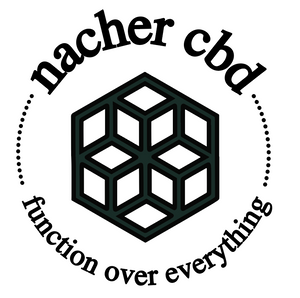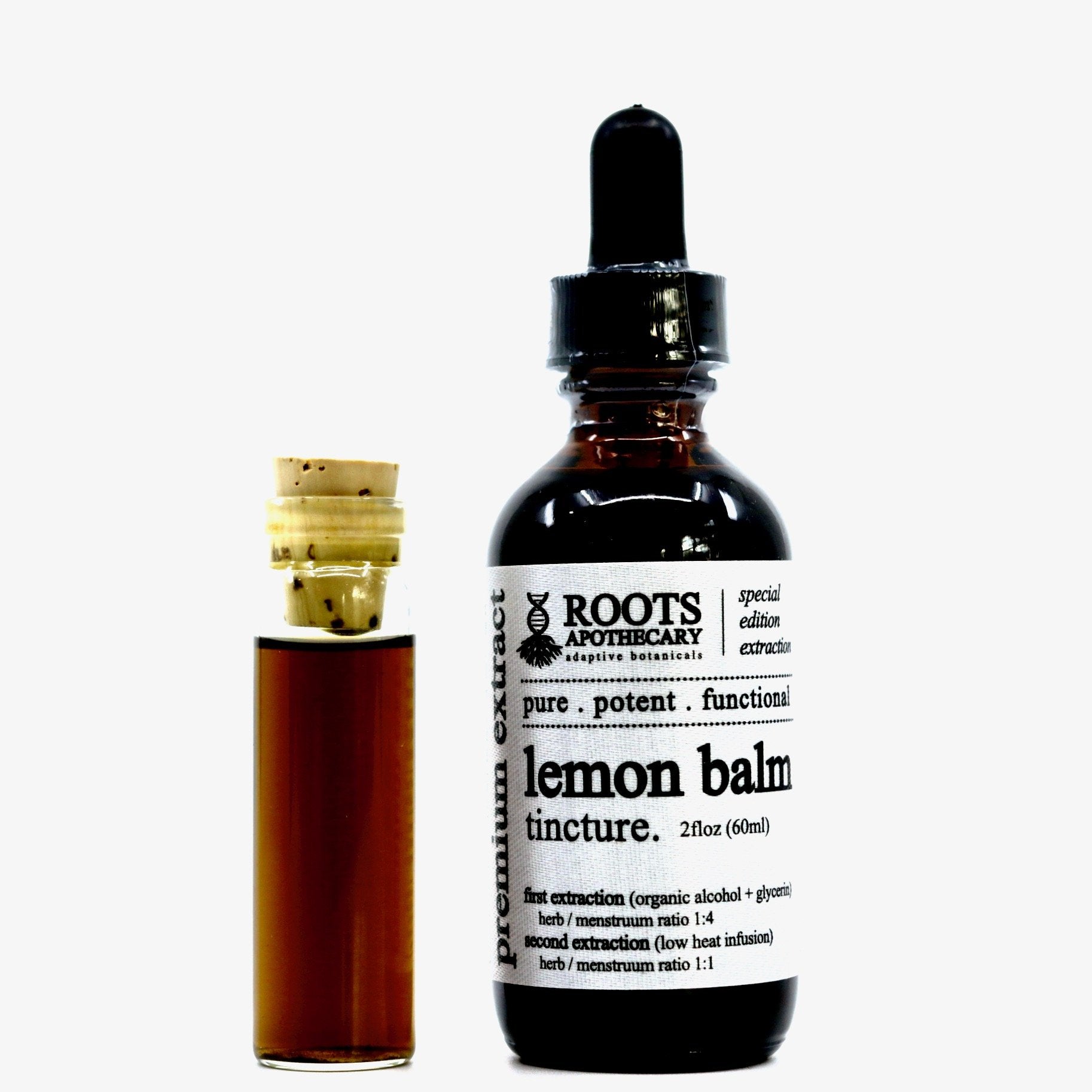lemon balm tincture.
lemon balm extract.
calming adaptogen.
- cortisol & stress response^
- mood & energy support^
- improved mental & physical stamina^
- adrenal balance^
-
overall health & wellness^
*certified organic
other ingredients.
*certified organic
lemon balm
Latin name: Ocimum sanctum
Common names: Tulsi, Tulasi, Holy Basil, The Queen of Herbs
Parts used: Leaves, flowers
Therapeutic Potential of Ocimum sanctum
It’s considered to be an adaptogen, which is a specialized class of herbs known to help the body adapt to stress and balance different processes in the body. Believed to promote longevity, holy basil extracts are used in Ayurvedic remedies for common colds, headaches, inflammation, stomach disorders, and different forms of poisoning or infection.
It’s believed that many of the physiological benefits in Holy Basil are attributed in its ability to help the body maintain homeostasis as well as protection of the body from toxin-induced damage. These functions are also commonly attributed to its high content of phenolic compounds and anti-oxidant properties. Studies have even shown that Holy Basil protects against toxic-chemical-induced injuries by increasing the body’s levels of antioxidant molecules and enzymes. It also helps reduce DNA damage and induce apoptosis in precancerous as well as cancerous cells which results in a reduction of growth of experimental tumors. holy basil can protect against damage caused by toxic compounds by enhancing the activity of liver detoxification enzymes.
A study published in 2017 by the School of Health Sciences, RMIT University in Victoria, Australia study mentioned previously also states that the chemical composition of Holy Basil is incredibly complex and contains many nutrients as well as other biologically active compounds.
They state that the quantity of many of the constituents that are present in the plant can be significantly affected by different growing, harvesting, processing and storage conditions.
Furthermore, it was stated that the overall effects of Holy Basil cannot be effectively duplicated with isolates due to its inherent botanical and biochemical complexity. Holy Basil standardization has, so far, eluded modern science.
Regarding the research of medicinal effect, the 2017 study mentions that there is mounting confirmation that holy basil can address physical, chemical, metabolic and psychological stress.
One way that is has been found to combat stress is by protecting organs and tissues against chemical stress induced from industrial pollution as well as heavy metals.
In relation to physical stress, a 2004 study conducted by School of Life Sciences, Devi Ahilya University, India, male mice were used as subjects that demonstrated the lowering of serum concentrations of cortisol and glucose with the use of a Holy Basil extract.
After the extract was administered, an anti-peroxidative effect was observed. This suggested a potential regulation of corticosteroid-induced diabetes.
Its thought that if this effect is correlative in humans that it could offer relief to patients experiencing adverse side effects from corticosteroids and even provide benefit to patients whose blood sugar regulation is compromised from the upregulation of serum cortisol.
If this effect is found in humans, it could benefit patients who experience adverse side effects from the use of corticosteroids.
A 2005 study examined the use of Ocimum sanctum to help the subjects better withstand the stress of chronic exposure to noise. The study used albino rats that were pretreated with an ethanolic extract of Ocimum sanctum leaves for seven days. These rats were then exposed to noise at the frequency of 10 kHz and a sound level of 100 dB. This pre-treatment prevented noise-induced changes in acetylcholine and acetylcholinesterase activity in the cerebral cortex, corpus striatum, hypothalamus, and hippocampus.
Alongside its anti-stress effects, it has been proven that Holy Basil contains radioprotective properties by scavenging free radicals and reducing oxidative damage induced from radiation. In animal experiments, it was shown to enhance post radiation survival and reduce organ damage.
Research from a 2007 study published by Evidence-based Complementary & Alternative Medicine has also shown that holy basil has strong anti-bacterial, an anti-viral and anti-fungal activity that can fight against several bacterias responsible for the infection. It’s been shown to boost immune response in both animals and healthy humans.
It has a special combination of healing properties as well as an analgesic effect that makes it superb in regards to wound healing.
They conclude their research by stating that,
“the results suggest that O. sanctum has antioxidant properties, which may be responsible and favorable for faster wound healing and this plant extract may be useful in the management of abnormal healing and hypertrophic scars.”
Using Holy Basil
With the information just presented it is safe to say that one can use Holy basil orally for its many properties and like any adaptogen, best results are achieved when used consistently and over a prolonged period of time. Holy basil is manufactured to be used in several different forms like powder, capsules, tinctures, and salves. As mentioned, it can be administered orally to achieve the myriad of health benefits and it can also be used topically on irritations or infections such as cuts, burns, scrapes, and even rashes.
History & Origin
Ocimum sanctum or more commonly known as Holy Basil or Tulsi is a widely used adaptogen that is native to the Indian subcontinent and widespread as a cultivated plant throughout the Southeast Asian tropics.
It is used famously in the ancient Indian medicine system, Ayurveda today and dating back thousands of years.
It’s even referred to as ‘The Queen of Herbs’ or the ‘Incomparable one’ in India and is known to be one of the holiest of the healing herbs that natives utilize. To this day, it’s still consistently used in religious and spiritual ceremonies and regarded as an ‘elixr of life’.
Calling an herb an elixir of life is certainly a bold and broad statement but this herb also has science on its side, backing up this claim in several in vitro and in vivo studies that have been conducted.
In Hinduism, Holy basil is worshipped as a goddess and every part of the plant is utilized and considered to be sacred, including the leaves, stems, flowers, roots, seeds, and oil. Even the surrounding soil is considered as divine and has just been found to contain beneficial endophytic fungi. (1)
Furthermore, in Hindi households, the holy basil plant is often considered to be a necessity that serves both practical and ceremonial purpose.
It’s integrated into their daily lives through rituals and spiritual practice that entails ingesting the leaves by consuming as a tea.
In addition to ingesting the herb, its wood and seeds are also used to make mala necklaces that are used during meditation practices.
Holy Basil has even been used in cities to help maintain air pollution as it contains anti-pollutant, anti-oxidant, and air purifying properties. This herb was planted in massive amounts all around the Taj Mahal in Agra to protect the iconic marble building from environmental pollution damage.
double extraction. tripple filtered.
The first extraction is 45 days of high quality, certified organic cane alcohol extraction (ethanol). After the herbs are strained, they are extracted a second time for 45 minutes at a low temperature (140deg F) with reverse osmosis water. The two extractions are combined and held at 140deg F for 10 minutes to flash a percentage of ethanol to maintain potency. The purpose of a double extraction is pulling both ethanol and water soluble nutrients from each herbal blend into solution. A double extraction does not dilute the strength of a tincture if done properly. A double extraction will only add to the complexity and overall quality of the tincture.
obvious disclaimer:
^These statements have not been evaluated by the FDA. This product is not intended to diagnose, cure, treat or prevent any disease. Please consult with a medical professional before consuming this product if you have any medical condition.


